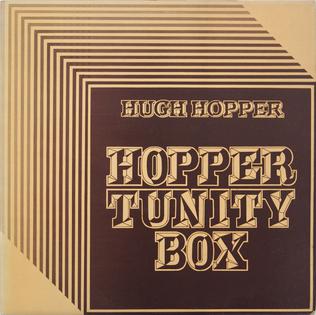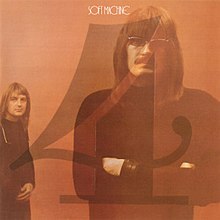
Soft Machine are an English rock and jazz band from Canterbury formed in mid-1966 by Mike Ratledge, Robert Wyatt, Kevin Ayers, Daevid Allen and Larry Nowlin. As a central band of the Canterbury scene, the group became one of the first British psychedelic acts and later moved into progressive and jazz rock, becoming a purely instrumental band in 1971. The band has undergone many line-up changes, with musicians such as Andy Summers, Hugh Hopper, Elton Dean, John Marshall, Karl Jenkins, Roy Babbington and Allan Holdsworth being members during the band's history. The current line-up consists of John Etheridge, Theo Travis, Fred Thelonious Baker and Asaf Sirkis.

Sir Karl William Pamp Jenkins,, HonFLSW is a Welsh multi-instrumentalist and composer. His best known works include the song "Adiemus", Palladio (1995), The Armed Man (2000), his Requiem (2005) and his Stabat Mater (2008).

Hugh Colin Hopper was a British progressive rock and jazz fusion bass guitarist. He was a prominent member of the Canterbury scene, as a member of Soft Machine and other bands.

Third is a live and studio album by the English rock band Soft Machine, released as their third overall in June 1970 by CBS Records. It is a double album with a single composition on each of the four sides, and was the first of two albums recorded with a four-piece line-up of keyboardist Mike Ratledge, drummer and vocalist Robert Wyatt, saxophonist Elton Dean, and bass guitarist Hugh Hopper. Third marks a shift in the group's sound from their psychedelic origins towards jazz rock and electronic music.

Volume Two is the second album by The Soft Machine, released in 1969. The album combined humour, dada, psychedelia and jazz. In 2000 it was voted number 715 in Colin Larkin's All Time Top 1000 Albums.

The Wilde Flowers were an English psychedelic rock band from Canterbury, Kent. Formed in 1964, the group originally featured lead vocalist Kevin Ayers, lead guitarist and co-lead vocalist Brian Hopper, rhythm guitarist and vocalist Richard Sinclair, bassist Hugh Hopper and drummer Robert Wyatt. Despite not releasing any material during their brief three-year tenure, the band are generally considered to be the originators of the Canterbury scene. After their breakup in 1969, the group's members went on to form numerous key bands within the scene, including Soft Machine, Caravan and Camel.

Bundles is the eighth studio album by the jazz-rock band Soft Machine, released in 1975.

Six is the sixth studio album by the jazz rock band Soft Machine. Originally released in 1973 as a double LP, the first disc is a live album and the second disc is a studio album. This is the first album to feature Karl Jenkins as a member the group, replacing Elton Dean. Jenkins eventually became the de facto leader and main composer of the group.

Septober Energy is the only album of the jazz/progressive rock big band Centipede. Produced by Robert Fripp under the musical direction of Keith Tippett, it was originally released 1971 in the UK as a double LP, and 1974 in the US with a different cover. The album was recorded at Wessex Studios, London during three days in June 1971. The album is a four-part suite consisting of four tracks of about 20 minutes each.

Centipede were an English jazz/progressive rock/big band with more than 50 members, organized and led by the British free jazz pianist Keith Tippett. Formed in 1970, it brought together much of a generation of young British jazz and rock musicians from a number of bands, including Soft Machine, King Crimson, Nucleus and Blossom Toes.

The End of an Ear is the debut solo album by Soft Machine's Robert Wyatt.

Seven is the seventh studio album by the jazz rock band Soft Machine, released in 1973. Bassist Roy Babbington, who had previously worked with the band as a session musician on the Fourth (1971) and Fifth (1972) albums, joined the band as a full-time member, replacing Hugh Hopper, who left to begin a solo career. This line-up change meant more than half of Soft Machine was now former members of the band Nucleus.

Fifth, is the fifth studio album by the jazz rock band Soft Machine, released in 1972. In the US the album was identified on cover and label by number (5).

Roy Babbington is an English rock and jazz bassist. He became well known for being a member of the Canterbury scene progressive rock band Soft Machine.
Delivery was a British blues/progressive rock musical group, formed in the late 1960s. The band was one of the wellsprings of the progressive rock Canterbury scene.
Soft Heap was a Canterbury scene and jazz-rock supergroup founded in January 1978 and active throughout the Eighties.

Softs is the ninth studio album by the jazz rock band Soft Machine, released in 1976.

Hopper Tunity Box is a 1977 album by jazz/rock musician Hugh Hopper. Ex-Soft Machine bassist augments his rather infamous fuzz-bass attack by performing on guitar, recorders, soprano sax, and percussion. The album recorded in 1976 and re-released on CD by Culture Press in 1996 and Cuneiform Records in 2007, this outing features the bassist's fellow Soft Machine bandmate, saxophonist Elton Dean, along with others of note.

Hidden Details is the eleventh studio album by the jazz rock band Soft Machine, released in September 2018.

















